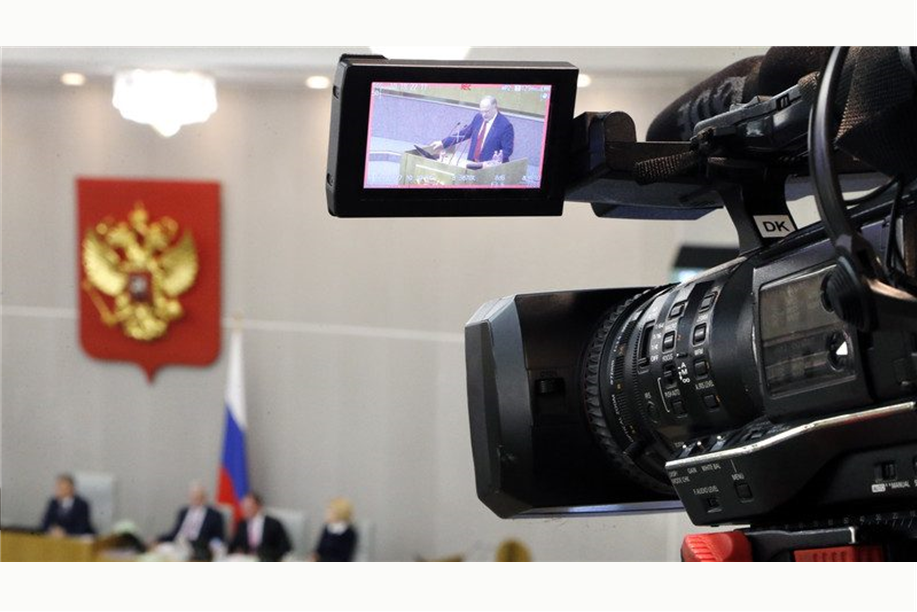Following Russia’s invasion of Ukraine, Western media began upending services in Russia as the country disseminated propaganda justifying its violence. While cutting Russia off from outside avenues for media has reduced its ability to target other countries with propaganda, it also increases Russian citizens’ reliance on the state for news, raising questions on the future of government and media action concerning information access.
On March 9, Russian forces bombed a maternity hospital in the city of Mariupol in Ukraine, killing at least three people, including a child, and trapping others under the rubble. On the following day, the Twitter account of Russia’s embassy in the U.K. claimed that photos of the scene showed actors with fake injuries. This is a classic example of the “crisis actor” conspiracy theory that is popular in U.S. far-right discourse.
Russian state media echoed the claims, and Twitter eventually took down the embassy’s post, citing a terms of service violation concerning the denial of violent events. This followed other instances of Western media companies blocking war propaganda, and invigorated debates on the effectiveness of Russian propaganda and whether democracies should stifle any media.
As Jon Allsop for Columbia Journalism Review wrote,
“Thanks to Putin’s media clampdown and mass arrests, anti-war sentiment and truth-telling are both increasingly perilous. Indeed, it seems to me that Putin is not trying to convince the entire Russian populace of his lies as much as solidifying his legitimacy with his supporters while silencing his critics. As the war goes on, it’s vital that we try to understand what his propagandists are saying, who they’re trying to say it to, and to what end — as therein will lie key clues as to his intentions and domestic standing. Nor should we assume that Russian news consumers will eventually reject lies in response to rational cues. That’s not how propaganda works anywhere.”
Russia’s propaganda model has evolved since its 2008 incursion into Georgia, building on Soviet Cold War-era techniques and emphasizing obfuscation and getting targets to act in the interests of propagandists without realizing they’ve done so. It has also adopted new strategies, leveraging the internet, social media, journalism, and media outlets.
This “firehose of falsehood” model of propaganda features many channels and a “shameless willingness to disseminate partial truths or outright fictions,” according to 2016 research by Christopher Paul and Miriam Matthews. Russian propaganda is also rapid, continuous, repetitive, and lacks commitment to consistency. These qualities contrast conventional wisdom on effective government influence, which traditionally emphasizes the importance of truth and credibility. Despite this, Russia has succeeded with its model through direct persuasion or by engaging in obfuscation, confusion, and the disruption of truthful reporting.
One of the many avenues for Russian war propaganda has been TikTok. A VICE News investigation revealed a coordinated campaign to pay Russian TikTok influencers to post pro-Kremlin narratives concerning the war, days before the platform suspended all livestreaming and new content from Russia. Even though the platform has banned new uploads from users located inside Russia, the campaigns have continued. A secret Telegram channel run by an anonymous administrator directs these influencers what to say, where to capture, what hashtags to use, and when to post.
Several past campaigns aligned with Russian government objectives, such as COVID-19 vaccines, the economy, and the Winter Olympics, but a recent campaign, documented by Ukrainian photographer Christina Magonova on her Instagram channel, showed a series of videos from prominent influencers reading the same script.
This attempted to excuse the war by falsely claiming Ukraine perpetrated a genocide against Russian speaking people in the Donbas region over the last eight years. There is no reported evidence for this genocide, though the influencers recite in hypnotic unison the narrative that the country’s invasion aims to end the ongoing death of innocent children.
Influencers, influenced: Russian-language tik tokers reciting propoganda. pic.twitter.com/nIwm4YuZ3b
— Sawbuck Wine (@sawbuckwine) March 5, 2022
A deluge of other social media companies has closed off their services to Russia. Some argue these actions by silicon valley’s social media giants have come too late, while others showed concern that communications platforms retracting service in Russia cuts off online spaces where critical, independent voices can share alternative perspectives.
Similarly, media companies including Facebook, TikTok, and Microsoft have cracked down on Kremlin-backed news outlets Russia Today and Sputnik following the European Union’s ban on Russian state media.
According to Natalia Krapiva, tech legal counsel at the digital rights group Access Now, YouTube and Instagram are two of the “few remaining online platforms in Russia for independent media to share the truth about what is happening in Ukraine.”
Too much or too late, as Erica Hellerstein writes for Coda, “Silicon Valley’s myth of laissez-faire neutrality is fracturing in real-time as the world recognizes the role the industry plays in modern conflict.” While these companies position themselves as impartial free speech defenders, they are essential to the unfolding of events in Ukraine.
In addition to social media companies pulling their availability in Russia, traditional media companies have withdrawn services and even journalists, with Bloomberg News and BBC becoming the first to stop producing journalism in Russia. The New York Times also said it pulled journalists from Russia, in part thanks to a new Russian law that made reporting dangerous and referring to the invasion of Ukraine as a “war” a punishable offense.
Network connectivity providers, too, have withdrawn from the country, making it increasingly isolated from news about the war that doesn’t come from Russia or its state media.
Internet advocates have shown concern that all these severed points of information access with make it challenging for Russian citizens to find reliable news on the war or stay in touch with family outside the country, who might give accurate accounts of the war and its consequences. Increased isolation runs the risk of leaving information access in the hands of the state.
Image by EPA-EFE / Maxim Shipenkov

